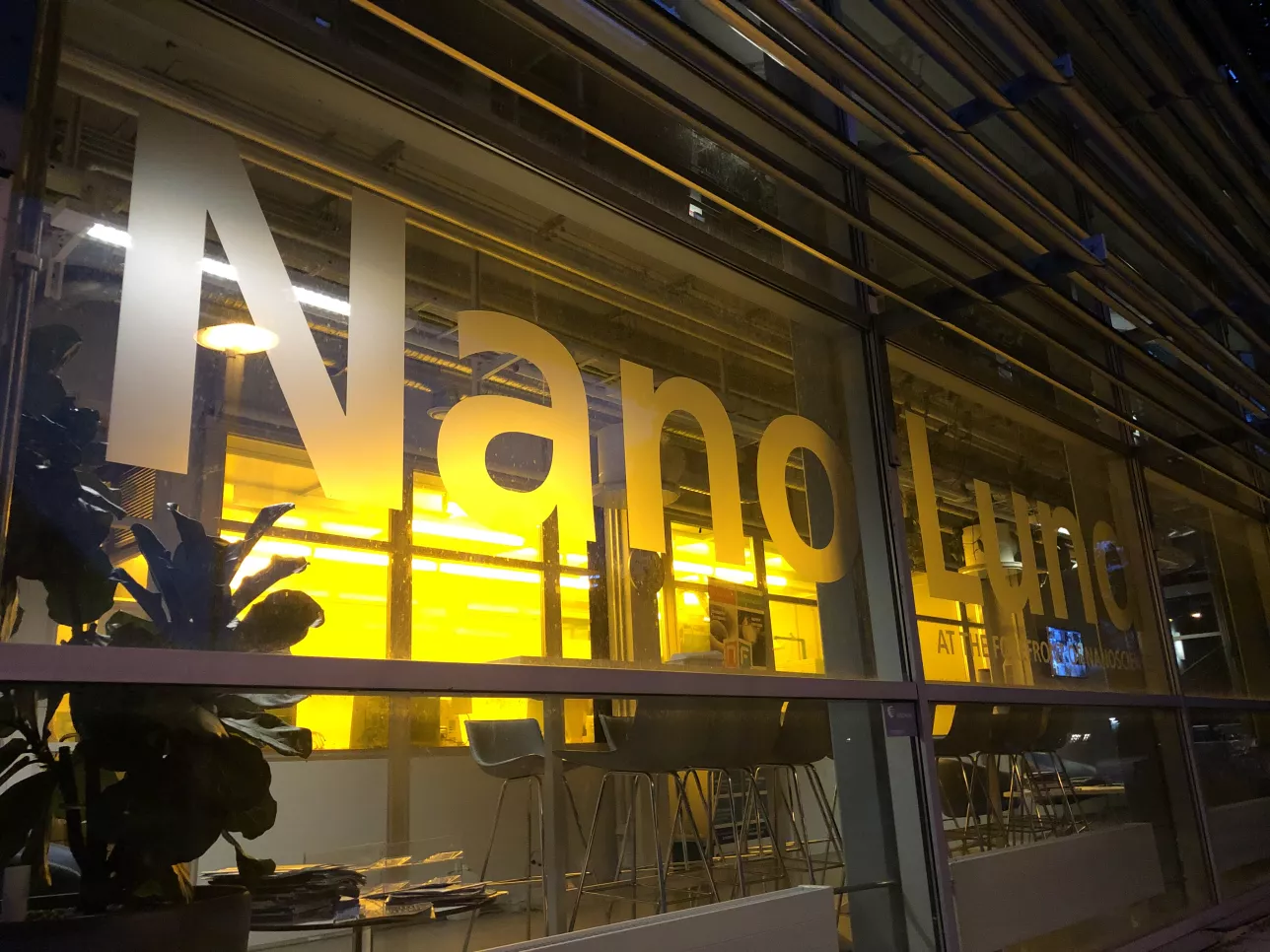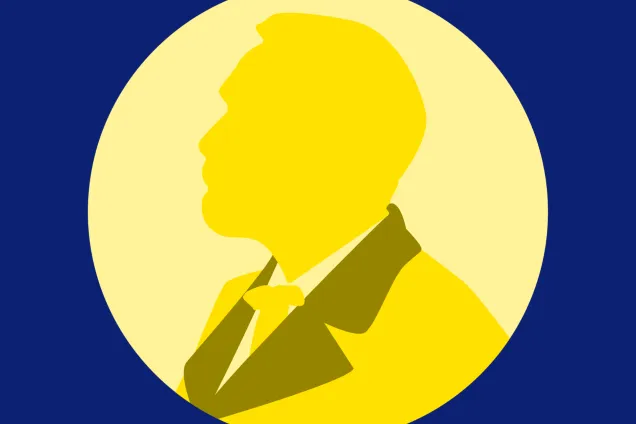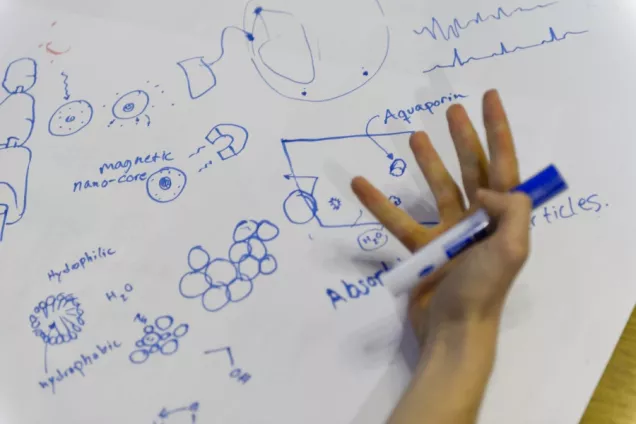Career Opportunities
Kick-start your career in interdisciplinary nanoscience and nanotechnology
A key success factor for NanoLund is our wide sharing of equipment that allows everyone – from doctoral students to new faculty – to access an incredibly wide range of capabilities within characterization, fabrication, and modelling, from the day they start working with us. NanoLund always welcomes applications from outstanding candidates for master’s projects, doctoral studies, or postdoctoral work. Welcome with your application!
We offer:
- a creative, world-class interdisciplinary research environment for fundamental and applied nanoscience
- state-of-the-art infrastructure for the fabrication and characterization of nanostructures
- a strong international nanoscience network
- a highly regarded scientific education
- internships in nanotechnology industry
- intellectual property training
- family-friendly living conditions and a high degree of social security
- a competitive salary and full employment contracts for doctoral students and postdocs
Current vacancies in NanoLund research groups
All positions are regularly posted in the Lund University recruitment system.
Selected vacancy announcements within NanoLund are listed below. To apply for a position, click the Login and Apply button in the vacancy announcement, and you will be guided to the recruitment system.
Assistant Professor in sustainable semiconductors
The subject area of the position is broadly defined within circular and sustainable semiconductors, covering for instance novel semiconductor manufacturing methods with drastically reduced environmental footprint, the consideration of material recycling already at the design stage, and novel device designs and concepts to enhance component lifetime and lower energy consumption.
The position is funded through the Mistra environmental research leaders program and includes a start-up package with funds to cover a doctoral studentship and other costs, as well as participation in a leadership program organized by Mistra.
Examples of research topics include, but are not limited to:
- Increase circularity and material recycling in fabrication of devices based on III-V and metal oxide semiconductors, one example being laser slicing to re-use substrates and reduce the use of the scarce element gallium in fabrication of GaN and Ga2O3 devices.
- Synthesis of new circular and sustainable semiconductor materials, use of earth-abundant materials, and hybrid organic-inorganic semiconductor materials. This could include highly innovative processes such as DNA-templated or protein-based synthesis, which essentially replaces highly advanced and resource demanding technology by wet-lab based bioprocesses.
- Enhance the lifetime and reduce the energy consumption of semiconductor components. This includes on-chip energy harvesting, heat management, and cooling to reduce thermal degradation, as well as technologies for computation with reduced energy consumption, such as low-dissipation wiring based on two-dimensional-, topological-, or superconductor-semiconductor materials, neuromorphic hardware, photonic chips, and other beyond-CMOS technologies.
The position in sustainable semiconductors is part of the Mistra Environmental Research Leaders program.
Employment as an assistant professor is a tenure track position, which aims for the holder to develop their independence as a researcher and educator. The work duties mainly involve research and teaching.
More information about the position
Head of Department: Dan Hessman
Read complete vacancy and apply online before 10 November 2025
Associate Senior Lecturer/Assistant Professor in Biomolecular materials with a focus on de novo design and synthesis
This recruitment is connected to the Wallenberg Initiative Materials Science for Sustainability (WISE, wise-materials.org), funded by the Knut and Alice Wallenberg Foundation. Read more: https://wise-materials.org
The current position concerns research and teaching in Biomolecular materials with a focus on de novo design and synthesis. The appointment will be based at the Department of Chemistry at Lund University. The successful candidate will be appointed as a WISE Fellow and, in addition to salary support, will receive a generous start-up package including funding for two PhD students and two postdoctoral researchers. WISE Fellows will engage in collaboration, training, and activities within the WISE program both nationally and at Lund University.
The subject of the position is the design of (non-natural) biomolecular materials using de novo methods and synthesis. This area of research lies at the interface of biochemistry, synthetic chemistry, and materials science, and draws on approaches from computational chemistry, physical chemistry, structural biology, and biotechnology. At the Department of Chemistry, we have strong research activities across all these areas, providing excellent conditions for further development of the field.
The aim is to design proteins or other biomacromolecules that spontaneously self-assemble into higher-order structures with tailored material properties. Both proteins and other (synthetic) biomacromolecules, such as DNA, offer the major advantage of being producible in a sustainable and environmentally friendly way using molecular biology methods.
Type of employment: Fixed-term position, 6 years, in accordance with Chapter 4, Section 12a of the Higher Education Ordinance, with the opportunity for promotion to senior lecturer.
Head of Department: Ola Wendt
Read complete vacancy and apply online before 3 November 2025
Post-doctoral fellow within Lung Bioengineering and Regeneration
Multi-drug resistant bacterial infections, such as Pseudomonas aeruginosa represent a significant global health care burden and disproportionately impact patients who are immunocomprised which make them more susceptible to opportunistic pathogens. These infections impact a broad range of patients including those with chronic diseases such as diabetes, cancer, organ transplant recipients, and those with chronic respiratory diseases. P. aeruginosa has been listed on the World Health Organization’s list of priority pathogens for at least a decade and was recently included as one of 15 pathogen families listed on the WHO’s Bacterial Priority Pathogens List (BPPL) 2024. There is an urgent need to increase research on P. aeruginosa to identify new therapies.
This project aims to develop a new humanized model of airway organoids which represent a more physiological path of infection. We will generate apical-out airway organoids (i.e. the upper layer of the epithelial cells will face out towards the media instead of inwards like conventional organoids). We will utilize induced pluripotent stem cells (iPSCs) to derive proximal and/or distal airway progenitor cells and develop custom microfluidic devices for longer term culture with live bacteria. The use of iPSCs is particularly important in this proof-of-concept grant as it opens up future possibilities to study more diverse patient phenotypes, especially among those patients who have underlying comorbidities and who may not undergo invasive bronchoscopy procedures where primary airway cells could be sourced (e.g. diabetes, cancer patients, etc).
The holder of this position will mainly work on a research project pertaining to the development of a 3D lung on a chip to study lung and airway infection using a combination of biomaterials and manufacturing advances.
The main work responsibilities involve designing and conducting research pertaining to the project and includes obtaining, analysing and developing ways to manage and store data acquired for the project. Further, the holder of this position will be responsible for writing of high quality, academic papers to be submitted to international journals and submitting both independent grants and contributing to grant writing for the group. The majority of this work should be done independently and in collaboration with both internal and external members of the team. The position also entails some teaching and mentoring of doctoral, masters, bachelor and medical students.
Group leader: Darcy Wagner
Read complete vacancy and apply online before 6 October 2025
Doctoral student in Physics within characterization of semiconductor nanostructures
The division hosts a new research initiative that targets the protein-templated synthesis of semiconductor nanocomposites using biofabrication techniques. Leveraging the recent advances in AI-driven protein design, the longterm vision is a fully circular manufacturing process for semiconductor nanostructures based on sustainable biofabrication. An important part of this effort is the electrooptical characterization of semiconductor nanostructures using contact-free techniques as well as techniques based on nanofabrication. The project is part of the InBio WISE-WASP NEST initiative. The PhD project will be jointly supervised by Prof. Heiner Linke and Prof. Vanya Darakchieva.
The goal of this PhD project is to develop characterization methods for protein templated semiconductor structures and to guide the protein design group in developing the templates. You are expected to work independently as well as in close collaboration with other researchers associated with the project.
The work duties include:
- Characterization of semiconductor nanostructures, including such fabricated by protein-templating. Methods comprise electrooptical and structural, contactless techniques (e.g. spectroscopic ellipsometry, SEM, TEM, AFM) as well as electric characterization of single nanostructures with nanofabricated contacts.
- The duties may also include participation in teaching and other departmental work (however, a maximum of 20% of working hours).
Group leaders: Heiner Linke and Vanya Darakchieva
Read complete vacancy and apply online before 20 October 2025
Researcher in Biomedical Engineering
Our group is well known within the field of acoustofluidics and fundamental experimental studies on ultrasonic resonances in microchannel to reveal how acoustic streaming and the acoustic radiation force can be utilised to manipulate microscale objects, cells and nanoparticles. Based on acoustofluidic principles we develop medical applications such as isolation of circulating tumorcells from cancer patient derived blood samples, or enrichment and biomarker analysis of extracellular vesicles in blood samples.
The work tasks are primarily to assist the research group in their research work, and there will also be some teaching and supervision.
Required qualifications include:
- a PhD within within the field of microscale acoustofluidics
- postdoctoral experience within the field of microchip based acoustofluidics
- documented experience of COMSOL-modelling within fluid mechanics, acoustofluidics and microfluidics
- documented experience of acoustofluidic based handling and separation of human blood
- documented experience of clinical chemistry blood diagnostics
- very good oral and written proficiency in English
Group leader: Thomas Laurell
Read complete vacancy and apply online before 3 October 2025
Laboratory technician at the Department of Physics
The position is placed at Lund Nano Lab, which belongs to the Department of Physics. Lund Nano Lab, which has approximately 20 employees and 140 users/ students, conducts extensive research in semiconductor physics, ranging from materials science to quantum physics. Lund Nano Lab is a central facility in a cleanroom environment for the production of materials and components on the nanoscale.
The main responsibility is to manage the daily needs of Lund Nano Lab, making it easier for users to conduct their research and development work. You will support the Director with purchasing and warehousing as well as handling process media, gases and supplies to and from the cleanroom environment, and some janitorial services may also be required.
We will place great emphasis on personal suitability. We are looking for someone who has a non-prestigious approach to your work tasks and a very good ability to collaborate with many parties. You are proactive, independent and service-oriented and have good collaboration skills. You are interested in working in an international and academic environment with great diversity and you have good communication skills.
Group leaders: Luke Hankin and Håkan Lapovski
Read complete vacancy and apply online before 7 October 2025
Research engineer, 1-2, with focus on processes at Lund Nano Lab
Lund Nano Lab is seeking one or two experienced Process Engineers with an emphasis on lithography and general fabrication. In this role, the successful candidate will conduct process, equipment and material improvement projects in support of the user base and in conjunction with the original equipment manufacturers (OEM). This involves exceptional team work and collaboration with other engineers in the LNL team as well as OEM’s to meet challenging, long-term research goals. You will interface with students, scientists and engineers to provide training and support on select processes and equipment, reporting to the Operations Manager of LNL. We are planning to build a new cleanroom at Science Village in Lund to double the current capacity, so this is an exceptionally exciting time to join the team.
For more information: https://www.nano.lu.se/facilities/lund-nano-lab
Group leader: Luke Hankin
Read complete vacancy and apply online before 10 October 2025
Would you like to have your vacancy posted here? Please send an e-mail to webmaster [at] nano [dot] lu [dot] se (webmaster[at]nano[dot]lu[dot]se).


HR Excellence in Research
Lund University has received EU’s certification, HR Excellence in Research, for its dedication to support career development of researchers.
Doctoral studies

Research opportunities in Sweden
The Swedish research council VR has collected some useful information and links about moving to Sweden to do research
Connect with us on LinkedIn
WISE: Wallenberg Initiative Material Science for Sustainability
The Wallenberg Initiative Materials Science for Sustainability (WISE) is the largest-ever investment in materials science in Sweden and will encompass major efforts at six of Sweden’s leading universities over the course of (at least) 10 years.

Master thesis projects available
Need help finding the right NanoLund supervisor for your project? Browse the topics currently available.


